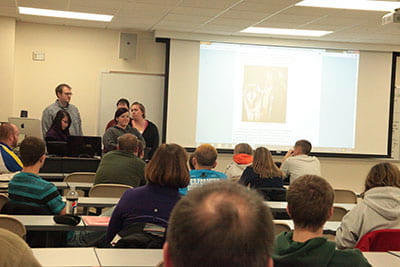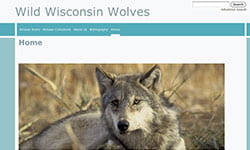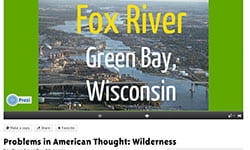Class embraces 360° of Learning with projects on wilderness ideal in Wisconsin

In launching a brand-new project for his History 302 students this semester, Associate Prof. David Voelker thought big.
He wanted something that tapped into students’ understanding of “the wilderness ideal in America” — a fresh topic for the course, titled “Problems in American thought.” He wanted students to conceive of their projects as works of public history, so wider audiences — including potential employers — could view them in the future. And he wanted to engage multiple perspectives and disciplines, capturing what UW-Green Bay long has embraced but until recently didn’t fully articulate — the University’s new brand, 360° of Learning.
 So Voelker, in true 360 fashion, sought the advice of colleagues from across the University and larger community — an alumnus who co-founded a sustainability-focused consulting firm, a colleague in First Nations Studies, and the head of UW-Green Bay’s Archives and Area Research Center among them. He took inspiration from numerous colleagues who have coordinated large projects, and he thought about ways to focus on both environmental sustainability and historical relevance. Voelker tailored the projects to focus on present-day Wisconsin, and turned his students loose for six weeks of in-depth team project work.
So Voelker, in true 360 fashion, sought the advice of colleagues from across the University and larger community — an alumnus who co-founded a sustainability-focused consulting firm, a colleague in First Nations Studies, and the head of UW-Green Bay’s Archives and Area Research Center among them. He took inspiration from numerous colleagues who have coordinated large projects, and he thought about ways to focus on both environmental sustainability and historical relevance. Voelker tailored the projects to focus on present-day Wisconsin, and turned his students loose for six weeks of in-depth team project work.
“I have observed a great deal of engagement,” Voelker said of his class, mostly History majors and minors but also students from other disciplines. “Many of the students are excited about their projects and appreciate the opportunity to pick their own subjects and presentation formats. All along the way, they are necessarily looking at issues from multiple perspectives — drawing on historians as well as different points of view on the current issue.”
 It’s the perfect framework for study and discussion in a course that explores the premise that “wilderness” is not simply an objective reality, but rather a culturally constructed ideal, Voelker said. Wilderness once was seen as a hostile force to be tamed, before people began to see the value in protecting it. Voelker’s course takes a critical look at the wilderness ideal from various points of view — including, for example, the fact that First Nations people were forced out of particular areas (such as certain national parks) for those areas to be considered “wilderness.” Environmental degradation, paradoxically, has resulted from some efforts to preserve the same.
It’s the perfect framework for study and discussion in a course that explores the premise that “wilderness” is not simply an objective reality, but rather a culturally constructed ideal, Voelker said. Wilderness once was seen as a hostile force to be tamed, before people began to see the value in protecting it. Voelker’s course takes a critical look at the wilderness ideal from various points of view — including, for example, the fact that First Nations people were forced out of particular areas (such as certain national parks) for those areas to be considered “wilderness.” Environmental degradation, paradoxically, has resulted from some efforts to preserve the same.
 Voelker’s students turned in and presented their final projects in class the week of Dec. 10. The five groups’ topics were Wild Wisconsin Wolves, Wisconsin Wetlands, the Crandon Mining Dispute, the Fox River (in Green Bay) and the three-part Baird Creek Greenway: Local Wilderness. The multimedia efforts included videos, photos, websites, links to other resources and more. You can view them online.
Voelker’s students turned in and presented their final projects in class the week of Dec. 10. The five groups’ topics were Wild Wisconsin Wolves, Wisconsin Wetlands, the Crandon Mining Dispute, the Fox River (in Green Bay) and the three-part Baird Creek Greenway: Local Wilderness. The multimedia efforts included videos, photos, websites, links to other resources and more. You can view them online.
Voelker will present on the class and its projects at the University’s Faculty Development Conference in January. It’s something that wouldn’t have been possible without his colleagues, and the ideals of 360° of Learning.
“This course and these projects,” Voelker said, “emerged out of a unique UWGB context.”





